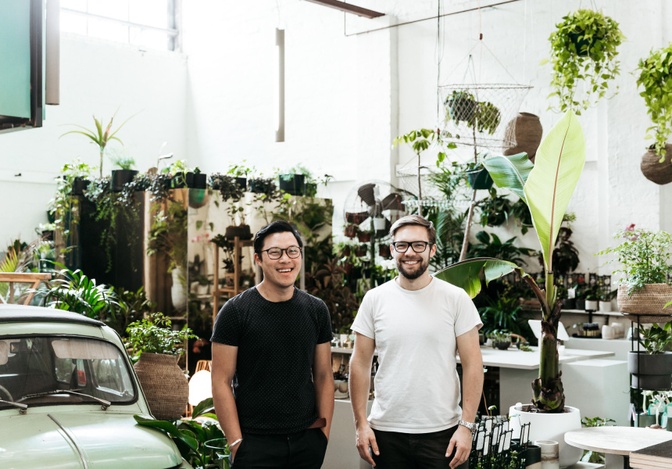Starting a small business is more accessible than ever.

Until recently, Jason Chongue worked as an architect, Nathan Smith as a flight attendant. Outside of their day jobs, the partners would discuss a mutual passion: plants. Twelve months on, they’ve turned that passion into a full-time job.
The pair now run The Plant Society, a Melbourne-based nursery and plant consultancy. “I love gardening but I never imagined myself in this position,” says Chongue. “But that was also a lesson: gardening is a big part of my life, so it should be a big part of my career.” Launching in August 2016 with nothing more than an Instagram account, some advice, and easily accessible tech tools, Chongue and Smith have taken The Plant Society from an idea to a lush shopfront in Collingwood, with a book on the way.
We asked Chongue for his tips on taking the leap from full-time work to turning a passion into a fully-fledged business - and the tech that helped get them there.
Initially a pop-up plant sale, The Plant Society was a way to meet potential customers and a likeminded community. “People would come along and ask what they did wrong and what they should grow,” says Chongue of their beginnings. “It was really important to have that social aspect. It wasn’t about [creating] a niche, it was about thinking through what customer service actually involves.”
A big part of that was being mobile. The duo used Square’s tap-and-go credit card reader paired with their smartphones to make transactions at their various markets and pop-ups. "When we started we were running a range of roaming ‘plant social’ events,” says Chongue. “So we needed simple tools that were portable, [because] our events and services meant team members regularly moved around Melbourne on a day-to-day basis. They’re taking payments on the go, at our plant shop, at markets and onsite with clients."
Through canny social media use, The Plant Society attracted a client base of retailers, quickly adding plant consultation, sourcing and maintenance to their business offerings.
“We have a lot of clients who go through heaps of plants,” says Chongue of their current roster. “Our consults help them choose plants, while our maintenance is because plants aren’t a retailer’s top priority.” Clients now include some of Melbourne’s most high-profile and image conscious venues, including Supernormal, Higher Ground, the Kookai concept store and the new Mercedes Me concept store.
Freely available tech has been crucial to growing The Plant Society’s business. It now has more than 21,000 Instagram followers. “It’s great because we can see what people are interested in as well as get our message across,” says Chongue. “I don’t post an image on Instagram unless I’m 100 per cent happy with it. It’s the same in the shop. If a plant looked a bit sad I wouldn’t buy it, so we take it off the shelf until it’s perfect.”
For their Collingwood store, run out of a converted warehouse and shared with Japanese café Mina-no-ie, The Plant Society upgraded from the mobile tap-and-go reader to the newly released Square Stand for its in-house point of sale system, thanks to its ability to streamline their business needs. "At the beginning we were just looking for cost effective ways to do the basics. But now we have a permanent retail space, plus extra customer services, we need different tools to service that growth,” says Chongue. “Having an all-in-one platform that allows us to manage employees, pull sales data and integrate with our accounting software has been invaluable."
Putting in the time to build relationships is non-negotiable, says Chongue. “I wasn’t shy about contacting other people,” he says. “Now we have industry mentors and we always talk to people about our new ideas. Not many people have even five minutes for anyone else these days, but we have projects where we’re talking with clients for three or four months before it actually launches.”
It’s this spirit that’s seen The Plant Society collaborate with up-and-coming ceramicists for collections to pair with their plants. The key is ensuring mutual benefit. “We give them exposure,” says Chongue. “The first ceramicist we started with is now so busy she stocks in other stores too. The collaboration was about her progressing as well.”


The downside of rapid growth is finding yourself unprepared for big decisions. Chongue says it’s important to take a step back every now and then to assess your limits. “We’ve actually held back on our growth to make sure we can do everything 100 per cent,” he says. “We need to make sure we’re happy with everything we do.”
For those considering a similar switch from day job to start up, Chongue says it’s important to set goals, then ensure all business decisions align with those goals. “There were so many things we’ve told ourselves we wouldn’t do, like have a shop or staff,” says Chongue. “Choosing the right business tools and taking calculated risks is important.”
This article is produced by Broadsheet Media in partnership with Square , a powerful point-of-sale business tool designed to help anyone with a passion or hobby to start their own business. Find out more or purchase here.



